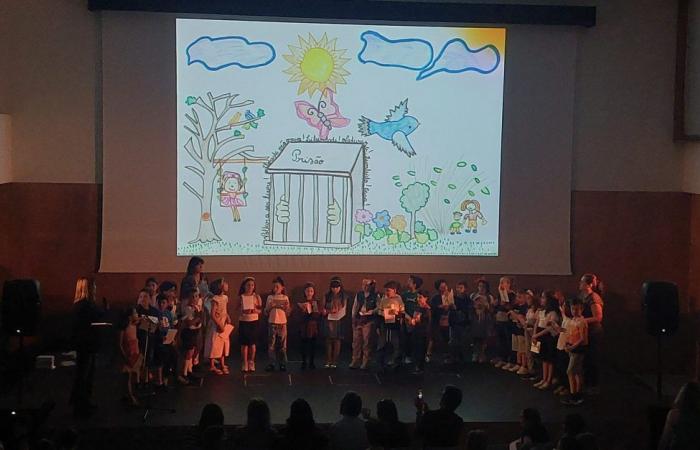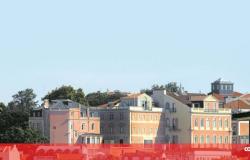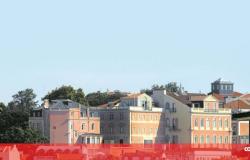Students from the Ovar School Group and inmates from the Aveiro Prison Establishment sign the book “Liberdade é.”, launched this Wednesday, at the José Macedo Fragateiro Secondary School, which demonstrates, among other perspectives, that “the biggest prison is that of the mind.”
This phrase is an excerpt from the 160-page publication that the company Águas da Região de Aveiro (AdRA) presented this Wednesday to the school public in the form of messages and songs, in a partnership that includes the Municipality.
The book is the result of a social and pedagogical project that AdRA began by developing at the school in the aforementioned prison and which was later extended to children in the 1st Cycle of Vareiros educational establishments and to students at Secundária Homem Cristo, in Aveiro.
This editorial project was in charge of the company’s Communication and Environmental Education coordinator, Nuno Vasconcelos Branco, who, in statements to Lusa, says that it all started in a Painting class at the prison: “The inmates started talking about what it was like to be there and one of them said that ‘freedom is being able to hug a tree’. This got us thinking and we immediately saw the potential of a project with them on the 50th anniversary of the 25th of April”.
First with a restricted circulation of just 300 copies and only available on the book market in June, “Liberdade é.” It thus came to consist of three segments: texts written by inmates aged from 20 to over 50 and illustrated by children from nine classes in the 2nd year of schooling; a series of statistical and historical data on the water sector at the time of the 25th of April, such as the cholera outbreak recorded in the 1970s in Porto and other cities in the country; and several essays by students at Escola Secundária Homem Cristo on environmental concerns and other social threats to individual and collective freedom.
“Freedom is not just about getting rid of evil and authoritarian regimes; it is also about having access to things, sensations, everything that human beings need to be complete – and that is why this book, with perspectives so different from each other, is truly inspiring”, says Nuno Vasconcelos Branco.
With “minimal edits to the texts”, this hardcover publication may not display the highest literary quality, but it “largely makes up for it as a sociological study” – especially because the project also involved the chain’s teachers and final year students of the University’s Design and Arts course. from Aveiro, who are now preparing a future exhibition about the same work.
The director of the Ovar School Group, Francisco Bernardo, thanked the efforts of students, teachers and parents to make this project possible.
Cláudio Pedrosa, assistant at the Aveiro Prison Establishment, highlights that the partnership between the different participants associated with the project resulted, “in addition to a crossing of very different ideas about Freedom, also a very rewarding intergenerational dialogue”.
The effect of this collaboration on the morale and behavior of inmates is particularly noted by those who work with them daily: “The changes are noticeable in interpersonal communication, between the inmates themselves and [no diálogo desses] with teachers, prison guards, technicians, health and administrative professionals and visitors from the free environment. In general, the relationship becomes more relaxed, the inmates are more communicative and good-humored, and, above all, they are more assertive in the face of setbacks, which reduces conflicts and tensions in the prison environment”.
Cláudio Pedrosa highlights that “there are also those who discover individual skills and abilities that they were unaware of in themselves” and adds that some inmates report “the satisfaction of making better use of the time they are deprived of freedom and the relief of anxieties and worries that made them more anxious and irritable.”
This person in charge hopes that the book “Liberdade é.” can now contribute to “transforming the social image of citizens who are temporarily deprived of liberty” and also improve ideas about prisons and the professionals who work there – many of them “based on television series and films that have very little relationship with the reality”.
“Opening the prison to the surrounding community can help them realize that they have an indispensable role not only in the process of monitoring sentences and deprivation of liberty measures, but also in welcoming and reintegrating these people when they return to life in freedom. ”, he explains.
Such help is decisive, in fact, to achieve the democratic spirit idealized by the Carnation Revolution, because “those who remember the prisons of 50 years ago know that a long journey has been made, towards a better reality, but they also know that this journey is never finished – transformation is a daily work that requires the collaboration of the surrounding community”.
The expectation of the deputy prison director is that the free population realizes that a stint in prison is not incompatible with enrichment and valorization on various levels: “One of the inmates mentioned that he had to come here to ‘free himself’ from drugs. A student confessed to feeling ‘unfree’ to choose a higher education course if it meant moving to another city and not being able to afford accommodation. Those in prison think and value freedom more than those who live outside of it, but there are also freedoms that are not restricted or that are even expanded, such as that of thought and artistic creation”.
As an example of this, Cláudio Pedrosa says that some inmates started writing poetry and “won literary prizes in national competitions, when, in freedom, they had never written a verse”. Others starred in plays, “discovered that they were capable of performing on stage, in front of a full auditorium, and want to continue this path when they get out of prison”.
Alexandra Couto (Lusa)
Tags: biggest prison mind Inmates children Ovar talk Freedom
--





